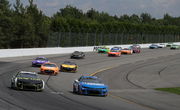
via Imago
DARLINGTON, SC – SEPTEMBER 02: Kevin Harvick 4 Stewart Haas Racing Mobil 1 Take 5 Ford talks with members of his crew during qualifying for the NASCAR, Motorsport, USA Cup Series Playoff CookOut Southern 500 on September 02, 2023 at Darlington Raceway in Darlington, SC. Photo by Jeff Robinson/Icon Sportswire AUTO: SEP 02 NASCAR Cup Series Playoff Cook Out Southern 500 EDITORIAL USE ONLY Icon2309021713500

via Imago
DARLINGTON, SC – SEPTEMBER 02: Kevin Harvick 4 Stewart Haas Racing Mobil 1 Take 5 Ford talks with members of his crew during qualifying for the NASCAR, Motorsport, USA Cup Series Playoff CookOut Southern 500 on September 02, 2023 at Darlington Raceway in Darlington, SC. Photo by Jeff Robinson/Icon Sportswire AUTO: SEP 02 NASCAR Cup Series Playoff Cook Out Southern 500 EDITORIAL USE ONLY Icon2309021713500
In the hours following the 2024 Phoenix race, the grandstands got lighter. Joey Logano had just clinched his third NASCAR Cup Series championship, also third in a row for Team Penske – yet thousands of fans were not satisfied. Thousands of fans quickly and quietly left the stands to miss the Victory Lane festivities. This consequence was because of a system over two decades old that Kevin Harvick criticized – and now another NASCAR veteran joins him.
When Harrison Burton won the Coke Zero Sugar 400 in August, he delivered an emotional 100th victory to Wood Brothers Racing. But the driver sealed a precious playoff berth – that other talented drivers missed out on. Kevin Harvick observed that talent is being sacrificed for entertainment – and Chris Gabehart also agrees.
ADVERTISEMENT
Article continues below this ad
Kevin Harvick’s supporter dials down showbiz importance
If you put yourself in a machine and go back a few decades, you will see an entirely different NASCAR situation. Legends like Carl Yarborough, Jeff Gordon, and Dale Earnhardt Sr. put up stellar seasons sometimes featuring double-digit wins – Richard Petty won 27 races in 1967. Back then, that was how champions were decided, based on merit earned throughout the season. Things changed in 2004. Then the elimination playoff format came into place in 2014. The slightest caution flag can create a major upheaval. For instance, Alex Bowman’s post-race weight test failed by the slightest margin, placing Joey Logano back in the playoffs – and the rest is history.
Similarly, Harrison Burton benefited from Xfinity driver Parker Retzlaff’s controversial push – and fetched his first career victory. As Kevin Harvick criticized such happenstance wins, Joe Gibbs Racing’s new competition director Chris Gabehart also did the same. In a recent interview, the latter pointed out why criticism is heavy against the playoff format. “Every race is about winning, but the difficulty in that is there are so many variables that go into an individual race that are out of the team’s control, things that are different than any other sport you want to talk about.”
Gabehart continued how the smallest change can turn a race upside down, as Kevin Harvick believed happened in the Daytona race. “It can be David Starr’s brake rotor exploding like it did for us in 2021 while we’re running down our other teammate, Martin Truex Jr. at Phoenix for our shot to win the championship. The brake rotor blows up, the caution comes out, and we come down pit road and next thing you know, Larson wins the championship.” He added that there should be an equal focus on showbiz and talent. “We all agree there needs to be an entertainment value of what we currently do. It’s simply getting the balance right of sport and entertainment that is unique to racing.”
SiriusXM: “We all agree there needs to be an entertainment value of what we currently do … It’s simply getting the balance right of sport and entertainment.”
Chris Gabehart on the NASCAR playoff format and his move to JGR’s comp director role. https://t.co/u4UPevLraw
— Motorsportsnaut (@SportsnautRacin) December 16, 2024
Gabehart brought back the incident from 2021 that got Larson his championship victory. Martin Truex Jr. looked like he was about the win his second title, leading the race with 30 laps left. However, Starr’s incident meant the caution came out and drivers ducked in to make pit stops. Hamlin and Larson both came in, but the place of the latter’s pit box combined with a slower stop for Hamlin meant Larson came out in front, effectively dooming MTJ’s championship hopes. Kyle Larson quickly took the lead and fended off the JGR car’s attempts at a win. While the JGR team did take the blame for the slower Hamlin pit stop, there was very little influence they could have had on the brake rotor issue.
Regardless, the negative results on the ratings because of this aspect of racing were always apparent – right from when NASCAR decided to change the format.
Trending
Not paying heed to the signs
Granted, the initial argument posed for changing the previous format was somewhat valid. Several championships in the ‘70s, ‘80s, and ‘90s were decided with races still left on the schedule. This trend reached a tipping point when Matt Kenseth won the 2003 championship by 90 points after one early-season victory and 23 more top-10 finishes.
ADVERTISEMENT
Article continues below this ad
So Brian France introduced the 10-week-long “Chase for the Cup.” The objective was the challenge the NFL for dominance in American sports. But it did not work. Ratings and attendance fell sharply, which coincided with the 2008 economic breakdown. France grew restless again in 2014 when he introduced the elimination format. The system would trim the field to four drivers across three cutthroat rounds. Then it will have them square off for a single, winner-take-all championship race.
Yet that coveted ‘increased’ interest due to France’s “Game 7 moments” never came. It has been six years since Brian France stepped down from his position after being charged with drinking and driving. And criticism against his beloved format continues to rise every season. Now, people are viewing Joey Logano’s 2024 championship as a tipping point – much like Kenseth’s 2003 title run.
With all eyes on NASCAR and hopes simmering for change, the situation still seems the same. Steve Phelps had a lot to say on the matter. He went on to explain, “We are going to look at it. And that will be an industry-wide decision, just like the existing format is. So, we’ll get a cross-functional team consisting of drivers, teams, NASCAR folks and sit in a room and see if there’s something better. Because for everyone that wants to make a change, you have some on the other side that doesn’t want to make a change. And I heard that all last weekend [during the NASCAR awards ceremony], ‘Please don’t change the format, the playoff system works really well.’ And others were like, ‘Please change the playoff format.’”
ADVERTISEMENT
Article continues below this ad
As the 2025 season rolls into view, let us see if the sport changes its format or not.
ADVERTISEMENT
ADVERTISEMENT
ADVERTISEMENT
ADVERTISEMENT





